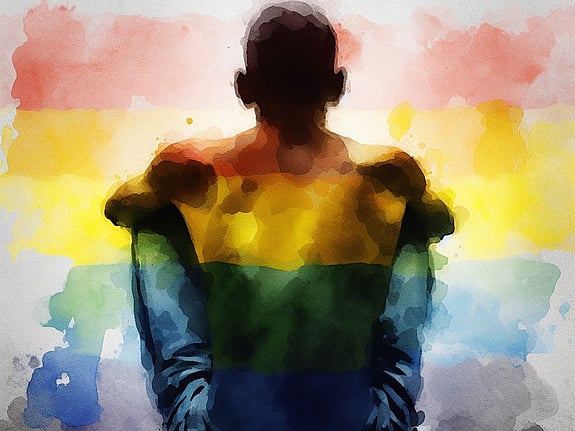There is a global oppression against individuals who are attracted to and in love with someone of the same sex. In many countries, this oppression is so strong that it poses a significant risk of facing violence and attempted murder. In some countries, it is even associated with long periods of imprisonment or the death penalty. The oppression and violence haunt many throughout their lives.
Some of those who face oppression manage to escape to another country. Sweden is one of the countries that grants asylum for this reason.
In a recently published study from the research project A Safer Future, researchers interviewed men who sought asylum in Sweden and identify as gay, homosexual, or bisexual.
- It is, of course, very important that those who need it should receive protection. Seeking asylum is a human right, and this right needs to be protected, says Maria Gottvall, who is a midwife and researcher in the project.
The study illustrates the challenging journey of seeking asylum. The situation was marked by an uncertain existence coupled with expectations to recount difficult memories to strangers. Long waiting times for interviews and decisions meant like living in an emotional roller coaster. Participants described frustration, hopelessness, and worry about what would happen if they were denied asylum. Being denied asylum was directly linked to life-threatening danger. Not knowing how things would turn out was a significant mental strain, leading to sleep difficulties and anxiety. Waiting for a decision was like being in limbo, waiting for a decision that will determine your fate.
- Naturally, our participants felt a great fear about what would happen if they were denied asylum and were forced to return to life-threatening situations. The emotional challenges when seeking asylum are many and difficult. You are expected to recount heavy traumas and authorities expect you to openly discuss parts of your identity that you may have hidden your whole life, says Tommy Carlsson, who is a midwife, associate professor, and the project leader.
The study highlights the importance of supportive and accepting communication during the investigation. Support from lawyers was particularly appreciated, and participants emphasized the importance of creating a sense of security during asylum interviews. Meeting investigators and interpreters from the same country of origin was difficult and posed challenges to being open in conversations. Some felt respected and that they received valuable support. Others experienced disrespectful behavior and homophobic attitudes during asylum interviews. The behavior of interpreters was considered very impactful for the possibility of giving an accurate account of the reasons for seeking asylum. Some interpreters had acted professionally and respectfully. However, there were occasions when interpreters acted judgmentally and surprised when the reasons for seeking asylum were discussed. For some, the interpreter's behavior led them to avoid disclosing information that could affect the asylum decision. After the asylum interviews, some participants felt that parts of what had been said had been misinterpreted, which could have serious consequences for their future.
To analyze the interviews and gain a deeper understanding, the researchers collaborated with individuals who themselves have experience coming to Sweden as refugees.
- We deeply resonated with the experiences of the participants having gone through the same processes. It’s crucial to have non-judgmental support when talking about your most difficult experiences. This will shape your life ahead. Participants who communicated through their native language were at the mercy of the interpreters, knowing that language barriers are a big determining factor for being granted asylum. The interpretation makes a difference between life and death, says the public contributors who analyzed the material.
The authors of the study conclude that these men experience mental health burdens when seeking asylum. Therefore, adequate support is required throughout the asylum process. When participants were granted asylum, they were overjoyed and eager to continue their lives in Sweden.
- We hope that the results can further build on the importance of providing adequate and safe psychosocial support for asylum seekers. Authorities, health services, and health professionals all have an ethical responsibility to address this. The study has provided many important insights into the emotional difficulties of seeking asylum. More research is needed to understand how the support should be designed and offered in the best possible way, says Tommy Carlsson.
The article entitled 'Your heart is resting and pumping at the same time': mental health impact of seeking asylum among sexual minority men has been published in the Scandinavian Journal of Public Health.
You can read the full article by clicking here.
Projektet En tryggare framtid finansieras av Forte. I projektet utforskas hur stöd, utbildning och stöd bör utformas för att möta behoven bland flyktingar som identifierar sig som HBTQ+.
Inom projektet appliceras en bred definition av HBTQ+, som är en förkortning av homosexuell, bisexuell, transperson och queer. Det innefattar också andra normöverskridande sexuella läggningar, kärleksrelationer, könsidentiteter och könsuttryck.


